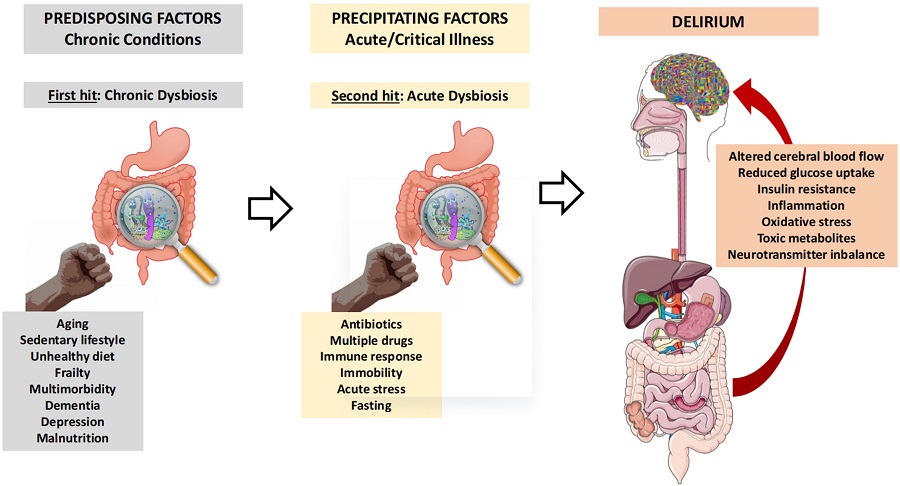📌 Delirium is a common clinical syndrome characterized by an acute change in attention, awareness, and cognition, frequently observed in older patients during hospitalization for acute medical illness or after surgery.
💡 This study provides a detailed analysis of the relationship between gut microbiota and delirium, highlighting key mechanisms, animal and human studies, and potential clinical implications.
📍 Mechanisms:
The pathophysiology of delirium is complex and may involve various mechanisms influenced by gut microbiota dysbiosis, including:
a. Microcirculation and Endothelial Dysfunction: Reduced cerebral blood flow and oxygen supply to the brain can contribute to delirium. Gut microbiota dysbiosis in animal models has been associated with vasoconstriction and endothelial nitric oxide synthase impairment, potentially affecting cerebral microcirculation.
b. Glucose Metabolism and Insulin Sensitivity: Hypoglycemia is a known risk factor for delirium. Gut microbiota influences insulin sensitivity, regulating glucose metabolism in the brain, which can contribute to delirium through impaired glucose utilization.
c. Inflammation and Blood-Brain Barrier Permeability: Peripheral inflammation and systemic inflammation have been linked to delirium. Dysbiosis in the gut microbiota can lead to systemic inflammation, altered gut mucosal permeability, and potentially affect blood-brain barrier permeability, allowing pro-inflammatory mediators to enter the brain.
d. Tryptophan Metabolism: Gut microbiota plays a role in tryptophan metabolism, impacting the production of indole derivatives, kynurenines, and serotonin. Dysbiosis may lead to inflammation, altered intestinal permeability, and disturbed neurotransmitter balance.
e. Oxidative Stress and Neurotransmitter Imbalance: Oxidative stress has been associated with delirium. Gut microbiota composition can influence oxidative stress and antioxidant capacity. Dysbiosis may also contribute to neurotransmitter imbalances, potentially affecting brain function.
f. Epigenetic Regulation: Gut microbiota can influence epigenetic regulation through DNA methylation, histone modifications, and long noncoding RNA molecules. Epigenetic changes have been observed in delirium and may have a role in its pathophysiology.
📍 Dysbiosis in the gut microbiota can influence various mechanisms associated with delirium, including inflammation, oxidative stress, neurotransmitter balance, and epigenetic regulation. Animal and human studies suggest that interventions targeting the gut microbiota may mitigate delirium-like symptoms.
Link to the article : https://tinyurl.com/2pcdmzr3
